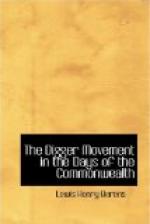FOOTNOTES:
[34:1] Clarke Papers, vol. ii. p. 209. Bulstrode Whitelocke, then already a member of the Council of State, in his Memorial of English Affairs (p. 396), under date April 17th, 1649, has an entry referring to and summarising this letter.
[34:2] That is to say, a week last Sunday, or last Sunday week.
[35:1] Loc. cit. vol. ii. p. 210.
[36:1] Loc. cit. vol. ii. pp. 211-212.
[37:1] P. 397.
[38:1] A glance at the titles of John Hare’s well-known pamphlets, the work of a learned, prosaic, diffuse, moderate, and loyal writer, suffices to show how widespread this jealousy and impatience of what he terms Normanism was. One runs as follows:—“St. Edwards Ghost or Anti Normanism: Being a pathetical Complaint and Motion, in the behalf of our English Nation, against the grand yet neglected grievance Normanism.” Another, {3}"Englands Proper and Only Way to an Establishment in Honor, Freedom, Peace and Happiness: Or the Norman Yoke once more uncased, and the Necessity, Justice, and Present Seasonableness of breaking it in pieces demonstrated, in Eight most plain and true Propositions, with their proofs.” The pamphlets are interesting only as showing the prevalence of the idea that the dishonour of the English Nation, and the slavery and impoverishment of the masses of the English people, were due to Norman Laws and institutions introduced by William the Conqueror.
[39:1] British Museum, Press Mark, E. 530.
CHAPTER V
GERRARD WINSTANLEY
“Your word-divinity darkens knowledge. You talk of a body of Divinity, and of Anatomysing Divinity. O fine language! But when it comes to trial, it is but a husk without the kernel, words without life. The Spirit is in the hearts of the people whom you despise and tread under foot.”—WINSTANLEY, The New Law of Righteousness (1649).
Gerrard Winstanley, whose strange entry on the stately stage of English History we have recorded in the previous chapter, was born at Wigan in the County of Lancashire, on October 10th, 1609.[41:1] He was, therefore, some ten years younger than his great contemporary Oliver




